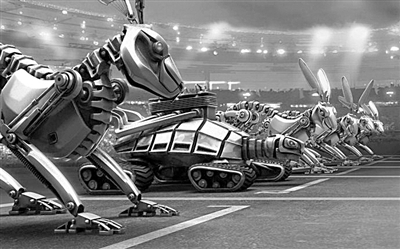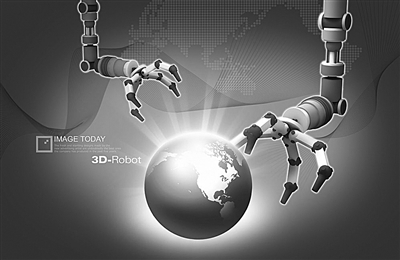Artificial intelligence: Only by knowing more about human nature can we sit on the top spot.


A week ago, Sony successfully made artificial intelligence compose three pop songs that were hard to distinguish between true and false. The last psychological defense line of mankind — — Perceptual creation is about to be solved. Artificial intelligence, like today’s smart phones, has become a way of life and opened up a huge new market, which is beyond doubt and unstoppable.
Twenty years ago, three or two giants carved up all the space in the PC era; Ten years ago, emerging internet companies completed "rebellion" in the era of mobile internet; Today, standing on the threshold of the era of artificial intelligence, where will the eyes of new and old technology giants look?
15 years from popularization?
In this era when "artificial mechanical transmission" is still the main way of social production and human movement, artificial intelligence seems to be far away from ordinary people.
However, the report of an international expert group on September 1 clearly tells us that by 2030, specialized artificial intelligence applications will become more and more common and practical, and economic development and quality of life will be greatly improved. In other words, there are still 15 years from the popularization of professional AI.
The report entitled "Artificial Intelligence and Life in 2030" is the first research result produced by a 100-year artificial intelligence impact research project. Submitted by a group of 17 experts in artificial intelligence and related fields hosted by Stanford University. Based on a typical city in North America, the research team investigated the possible impact of artificial intelligence on people’s production and life in the next 15 years. These eight aspects are transportation, housekeeping, health care, education, entertainment, low-resource communities, public safety and security, and employment and workplace.
Researchers believe that applications that use artificial intelligence technologies such as computer vision, deep learning and natural language processing to perform specific tasks will be everywhere. It is expected that more and more artificial intelligence technologies will be widely used in self-driving cars, medical diagnosis and directional treatment, and life assistance for the elderly. Artificial intelligence technology and robots will also be applied to industries that are difficult to attract young labor, such as agriculture and food processing. Drones, driverless trucks or delivery robots will make the transportation of online shopping goods more convenient. According to this report, by 2030, artificial intelligence may have a positive and profound impact on economy and society.
The third "World War" is faintly visible.
Faced with this almost completely blank brand-new market, Chinese and foreign technology giants who have experienced two "world wars" of PC and mobile internet have rushed to prepare for the third time.
Since the beginning of this year, Intel has successively acquired FPGA manufacturer Altera, deep learning company Nervana and machine vision company Movidius;; Apple acquired machine learning startup Tuplejump Software;; Google acquires chat bot startup API.A;; IBM teamed up with MIT to create a "Multimedia Machine Understanding Laboratory for Stimulating the Brain"; Facebook announced the establishment of an artificial intelligence research and development laboratory; Tencent announced that it will introduce artificial intelligence technology into the application treasure to create a new model of robot distribution … …
The back of a series of actions such as acquisition, cooperation, and building a laboratory.
After that, it is an artificial intelligence market filled with smoke and competing with each other. The killer weapon that each family is desperately building is to build its own "ecosystem" — — Based on the existing advantages, an open ecosystem will be built, which will radiate to the whole reaction chain of the upstream and downstream of the industry, and an "open" ecosystem will be built through acquisition and cooperation.
IBM, which relies on Watson to firmly occupy the highland of smart medical care, has already gathered a large number of enterprise resources in the upstream and downstream industries. In August this year, Watson’s healthy territory was extended to China by introducing cancer-assisted diagnosis and treatment solutions to 21 hospitals in China.
Microsoft, a "century-old shop" that started with software, built an open "smart ecology" around its traditional advantages in its main business. Wang Yongdong, president of Microsoft Asia Institute of Engineering, told reporters that how to combine artificial intelligence technology with Office software is one of the main directions of Microsoft’s next step.
Coincidentally, opening up the accumulated AI technology to entrepreneurs through an open platform is the main development idea of Tencent’s artificial intelligence layout, which started as an online social platform.
In addition to the model, the investment in artificial intelligence technology research and development, each family is even more willing to pay for it.
"Artificial intelligence involves too many fields. Many times, even if we don’t see a clear product form, we will fully invest in technology." Wang Yongdong described the technology research and development investment of giant companies in this field for several years. In the technology research institutes of Microsoft, IBM, Intel and other technology giants, technical research in various directions such as machine learning, deep learning, speech recognition and image recognition is going on every day.
Song Jiqiang, president of Intel China Research Institute, told the reporter that in constructing machines based on artificial intelligence, it is necessary to transmit data to the machines through various sensors, so that the machines can make feedback and processing at the first time. At the same time, the invisible back-end processing process includes a lot of machine calculation and learning, such as character recognition, speech recognition, image recognition, etc., but it has not been completely exhausted, and the cognitive exploration of higher dimensions is just beginning in the industry.
The requirement of rapid technology also urges the synchronous update of hardware industry. The "hard technology" behind supporting machine learning is high-performance computing, and the traditional CPU can no longer afford this task. It is precisely because of this that various "giants" have focused their attention on the position of artificial intelligence dedicated processors: Google launched TPU, IBM launched Power series, and NVIDIA launched GPU… … The upsurge of "conflation" in the field of smart chips and processors has intensified.
As two giant companies in the traditional server chip market, both NVIDIA and Intel hope to extend their leading position in PC industry to the field of artificial intelligence. Different from NVIDIA’s strategy of focusing on improving GPU performance, thus accelerating the development of machine learning, Intel plans to improve and optimize its own artificial intelligence processor with the characteristics of different architectures. In addition to GPU, the chip manufacturers acquired by Intel cover almost all the existing processor architectures.
"The field of artificial intelligence is just the beginning of high-performance computing." Song Jiqiang said that in the future, Intel will make full use of its mature chip production chain, starting from the upstream industries of artificial intelligence, namely, computing software research and development and processor production, and carry out an end-to-end comprehensive link from micro sensors to enterprise cloud processors.
Whoever has "humanity" first wins.
Before answering who can laugh last, we must ask: In the future, where will artificial intelligence develop?
"Even after a hundred years, artificial intelligence has an independent consciousness, and what they are doing is still helping human beings. We will always be friends with them. " At the Tencent Global Partner Conference on September 23rd, Apple co-founder Wozniak said. But he also believes that in the near future, artificial intelligence will surely become another epoch-making technology that subverts the human lifestyle.
"We can produce a large number of computers and give them different personalities. They may learn a lot in the process of growing up and constantly improve — — In the future, computers may have independent thinking and consciousness, not just following our orders, but having their own consciousness. " Wozniak said.
Wozniak’s view may represent a common consensus in the industry. Yuval harari, the author of A Brief History of Mankind, also made a similar statement at Tencent Global Partner Conference: "Today, we may have to separate intelligence from perception, but when artificial intelligence develops to a certain stage, these two things must coexist."
These "big coffee" in the industry generally believe that due to the limitation of technical conditions, artificial intelligence at this stage is still more focused on developing "intelligence", and from "intelligence" to "humanity", perception and emotion are the future development direction of artificial intelligence. And this is also a key link to determine who can sit at the top of the industry for technology companies interested in artificial intelligence in the world.
"Human emotions are not supernatural and magical things. AI is developing the ability to analyze human voices and expressions by acquiring massive information to analyze human emotional conditions. This kind of information obtained based on data analysis is actually more reliable than the data obtained by our senses. " Herali said.
Herari’s statement is no longer a fantasy. "In the future, with the continuous maturity of technical conditions, we will consider more, not just how to make the machine more ‘ Intelligence ’ , but how to make the machine ‘ More like a person ’ 。” Wang Yongdong told reporters that Xiao Na and Xiao Bing, Microsoft’s "online celebrity sisters", are their explorations in different dimensions based on "how to combine humanity and intelligence". "Xiao Na is more focused on IQ dimension, like a work ‘ Little secretary ’ Now she can help you order takeout and push music; Xiao Bing, on the other hand, focuses on the EQ dimension, which is based on the exploration of humanity and emotion. She has been bound to the background of nearly 20,000 WeChat WeChat official account, and can chat with you and answer your questions — — Perhaps, in the future, they can also be combined into one, and it depends on what kind of realm we can achieve in the exploration and learning of artificial intelligence. "